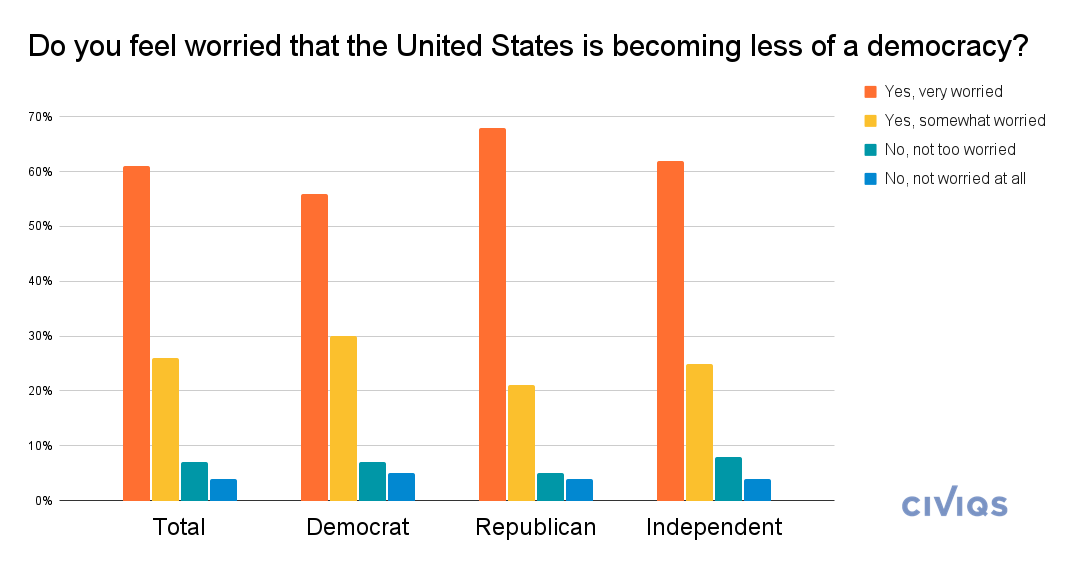Opinion: Why won’t Republicans show the courage to condemn their party’s race-baiting?

A recent poll by Civiqs found that only 16 percent of Republicans agreed that “people of color in America face discrimination and unfair treatment based on race.” But 54 percent of Republicans agreed with the statement, “White people in America face discrimination and unfair treatment based on race.”
Report: Americans are Worried About Democracy, But Disagree on Why

The June 2021 Daily Kos/Civiqs Poll asked 1,416 registered voters in the United States about new voting rights legislation, global COVID-19 vaccination, Republican support for President Trump, race relations, the Senate filibuster, and more.
Why It’s So Hard To Gauge Support For QAnon

A rolling tracker from Civiqs has found that less than 10 percent of Americans consistently say that they are a supporter of QAnon and that number has declined over the past year.
Modest goals for Kamala Harris in her first foreign trip

A majority of Americans — 86 percent of Democrats, 87 percent of Republicans and 81 percent of Independents — agree that the U.S. government should work more closely with other countries in the region to preemptively reduce migration, according to a Civiqs poll.
Why Biden’s Handling Of The Pandemic Polls Better Than His Overall Approval

Partisanship affects how people view the economy. As tracked daily by Civiqs, the share of Democrats who thought the economy was getting worse rose after Trump took office, while the share of Republicans who thought the same spiked rafter Biden won the 2020 election.
White America: Awakened?

One year after the death of George Floyd, data suggests public opinion on racial justice issues has changed dramatically, powering a sustained and historically significant wave of activism among white Americans.
George Floyd’s Murder Changed Americans’ Views on Policing

The Civiqs poll helps explain that the number of Republicans saying they opposed Black Lives Matter steadily dropped over the past few years. Today, however, Republican opinions are virtually identical to where they stood four years ago.
Support for Black Lives Matter Surged Last Year. Did It Last?

According to data from Civiqs, there has been a net increase in favorability toward Black Lives Matter since 2018. Notably, support for the movement peaked in the immediate aftermath of George Floyd’s death and then declined.
Report: Americans Support Universal Pre-K and Free Community College

The May 2021 Daily Kos/Civiqs Poll asked 1,464 registered voters in the United States about taxes, public education funding, lowering the Medicare enrollment eligibility age, the effects of the COVID-19 pandemic on Americans' jobs, schooling, and housing, the January 6 attack on the U.S. Capitol, and more.
Republicans’ Pessimistic Views On The Economy Have Little To Do With The Economy

Civiqs daily tracking polls have asked Americans about the economy each day since June 2016. Perceptions of the national economy have changed wildly depending on whether a Democrat or a Republican is in the White House.